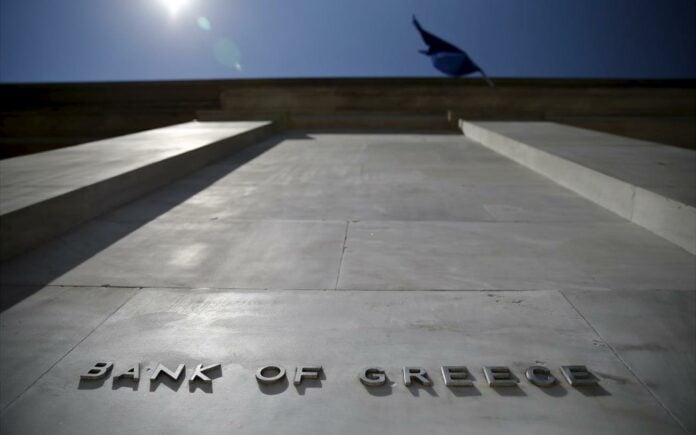The Bank of Greece on Friday released figures on the current account deficit for December 2015, which showed a significant decrease in relation to the corresponding month of 2014, although the figure was still near the one-billion-euro mark, even amid a continuing harsh economic crisis.
The press release by the BoG:
“In December 2015, the current account showed a deficit of €0.8 billion, down by €1.1 billion year-on-year. This amelioration is attributable to the improvement in the balance of goods, as well as in the primary and secondary income accounts, which offset the narrowing of the surplus of the services balance.
The deficit of the balance of goods shrank by €545 million year-on-year, as a decline was recorded in the deficits of all subaccounts. More specifically, a 4.2% increase was observed in the exports of goods excluding oil and ships.
The surplus of the services balance fell by €174 million, as a result of lower net transport (mainly sea transport) receipts. Travel receipts registered a rise of 12.2%, a rate much higher than that in December 2014 (2.2%), which resulted in an improved travel balance, despite the fact that the number of non-residents’ arrivals decreased by 9.3%. Moreover, the other services balance improved as well.
As a result of the above-mentioned developments, the value of exports of goods and services declined by 13.8%, but the value of imports fell more (16.8%), so the deficit of the balance of goods and services shrank by €371 million.
The primary income account showed a surplus of €323 million, against a deficit in the same month of 2014 (improvement of €365 million), mainly as a result of a rise in the surplus of the other primary income account – which includes taxes and subsidies on products and production – as well as of lower net interest and dividend payments. At the same time, the secondary income account also showed a small surplus, against a deficit in December 2014.
During 2015, the current account showed an amelioration of €3.8 billion and came close to balance. This reflects the improved balance of goods and services, which recorded a deficit of €235 million, compared with a deficit of €4.0 billion in 2014. Overall, the value of exports of goods and services fell by 8.8%, but the value of imports decreased at a faster pace of 14.3%.
In 2015, the deficit of the balance of goods registered a considerable fall of €5.0 billion, due to an amelioration in all subaccounts. More specifically, the oil balance improved significantly, on account of lower international oil prices. In addition, transactions concerning purchases and sales of ships were also significantly reduced, largely due to the fact that they are conducted outside the Greek banking system as a result of capital controls. Finally, it should be noted that exports of goods excluding oil and ships rose by 4.6%, while the corresponding imports declined by 1.5%.
The surplus of the services balance shrank in 2015, as net transport receipts registered a decline, which is also largely attributable to capital controls. This development was partly offset by a rise in net travel and other services receipts. In 2015, total non-residents’ arrivals increased by 7.1%, while the corresponding receipts grew by 6%.
In 2015, the primary income account showed a surplus of €739 million, up by €166 million year-on-year, on account of lower net interest, dividend and profit payments, as well as of lower payments for wages and salaries. This improvement almost offset the deterioration in the secondary income account.
Capital account
In December 2015, the capital account showed a surplus of €137 million, down by €109 million year-on-year, mainly due to a decline in net capital transfers from the EU to general government. In 2015, the capital account showed a surplus of €2 billion, down by €522 million year-on-year.
Combined current and capital account
In December 2015, the combined current and capital account (corresponding to the economy’s external financing requirements) showed a deficit of €643 million, down by €980 million year-on-year. In 2015, a surplus of €2 billion was recorded, against a deficit of €1.3 billion in 2014.
Financial account
In December 2015, under direct investment, a net increase of €154 million was recorded in residents’ external liabilities, which represent non-residents’ direct investment in Greece. The most significant transaction concerned an inflow of €350 million from Fairfax Financial Holdings Limited (Canada) for its participation in the capital increase of Eurobank.
Under portfolio investment, a net increase of €5.4 billion was recorded in residents’ external assets, which is mainly attributable to a rise of €6.0 billion in residents’ holdings of foreign bonds and Treasury bills. This hike largely reflects Greek banks’ holdings of ESM bonds, which they acquired in the context of their recapitalisation. On the liabilities side, a net increase of €1.0 billion was recorded, which is mainly attributable to a rise in non-residents’ investment in shares of Greek firms and largely reflects foreign investors’ purchases of bank shares in the context of the recent recapitalisation of Greek banks.
Under other investment, a net decrease of €2.4 billion in assets is for the most part a result of a decline in residents’ deposit and repo holdings abroad. A net increase of €2.6 billion in liabilities reflects mainly a net rise of €5.3 billion in the outstanding debt of the public and the private sector to non-residents (including a new ESM loan of €6.4 billion to the Greek State).
In 2015, residents’ net assets from direct investment abroad rose by €345 million, while the corresponding liabilities that represent non-residents’ direct investment in Greece dropped by €258 million.
Under portfolio investment, a net increase of €7.0 billion in residents’ external assets is mainly due to a rise of €6.4 billion in their investment in shares of foreign firms. Moreover, residents’ net external liabilities fell by €1.4 billion, mainly on account of a decline in non-residents’ investment in Greek government bonds and Treasury bills, which was offset to a large extent by a rise in non-residents’ investment in shares of Greek firms.
Under other investment, a net increase in residents’ external assets and liabilities largely reflects the statistical adjustment associated with the issuance of banknotes (2). In addition, regarding assets, residents’ deposit and repo holdings abroad registered a net rise of €1.3 billion. On the liabilities side, a net increase of €5.3 billion was recorded in non-residents’ deposit and repo holdings in Greece (the TARGET account included) and a net rise of €3.1 billion in residents’ outstanding debt.
At end-2015, Greece’s reserve assets stood at €5.5 billion, compared with €5.1 billion at end-2014.














